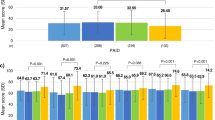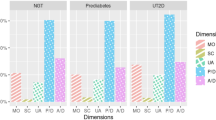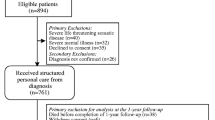Abstract
Few studies have identified determinants of glycemic control (HbA1c) and diabetes-specific quality of life (DSQoL) in adults with type 1 diabetes. To identify factors predicting outcomes following structured diabetes education. 262 participants completed biomedical and questionnaire assessments before, and throughout 1 year of follow-up. The proportion of variance explained ranged from 28 to 62 % (DSQoLS) and 14–20 % (HbA1c). When change in psychosocial variables were examined, reduced hypoglycemia fear, lower ‘perceived diabetes seriousness’, greater self-efficacy and well-being predicted QoL improvements from baseline to 3-months. Increased frequency of blood glucose testing predicted improvements in HbA1c from baseline to 6-months. Greater benefits may be achieved if programs focus explicitly on psychosocial factors. Self-care behaviours did not predict HbA1c suggesting existing assessment tools need refinement. Evaluation of treatment mechanisms in selfmanagement programs is recommended.
Similar content being viewed by others
References
Aalto, A. M., Uutela, A., & Aro, A. R. (1997). Health related quality of life among insulin-dependent diabetics: Disease-related and psychosocial correlates. Patient Education and Counseling, 30, 215–225.
Assal, J. P., Jacquemet, S., & Morel, Y. (1997). The added value of therapy in diabetes: The education of patients for self-management of their disease. Metabolism, 46, 61–64.
Bollen, K. A., & Curran, P. J. (2006). Latent curve models: A structural equation perspective. Hoboken, NH: Wiley.
Bonsignore, M., Barkow, K., Jessen, F., & Heun, R. (2001). Validity of the five-item WHO Well-Being Index (WHO-5) in an elderly population. European Archives of Psychiatry & Clinical Neurosciences, 251, 27–31.
Bott, U., Jorgens, V., Grusser, M., Bender, R., Muhlhauser, I., & Berger, M. (1994). Predictors of glycemic control in type 1 diabetic patients after participation in an intensified treatment and teaching programme. Diabetic Medicine, 11, 362–371.
Bott, U., Muhlhauser, I., Overmann, H., & Berger, M. (1998). Validation of a diabetes-specific quality-of-life scale for patients with type 1 diabetes. Diabetes Care, 21, 757–769.
Byrne, M., Newell, J., Coffey, N., O’Hara, M. C., Cooke, D., & Dinneen, S. F. (2012). Predictors of quality of life gains among people with type 1 diabetes participating in the dose adjustment for normal eating (DAFNE) structured education programme. Diabetes Research and Clinical Practice, 98, 243–248.
Cochran, J., & Conn, V. S. (2008). Meta-analysis of quality of life outcomes following diabetes self-management training. Diabetes Educator, 34, 815–823.
Colagiuri, R., & Eigenmann, C. A. (2009). A national consensus on outcomes and indicators for diabetes patient education. Diabetic Medicine, 26, 442–446.
Cooke, D., Bond, R., Lawton, J., Rankin, D., Heller, S., Clark, M., et al. (2013a). Structured type 1 diabetes education delivered within routine care: Impact on glycemic control and diabetes-specific quality of life. Diabetes Care, 36, 270–272.
Cooke, D., O’Hara, M. C., Beinart, N., Heller, S., La Marca, R., Byrne, M., et al. (2013b). Linguistic and psychometric validation of the diabetes-specific quality of life scale (DSQOLS) in UK English for adults with type 1 diabetes. Diabetes Care, 36, 1117–1125.
Cox, D. J., Irvine, A., Gonder-Frederick, L., Nowacek, G., & Butterfield, J. (1987). Fear of hypoglycemia—Quantification, validation, and utilization. Diabetes Care, 10, 617–621.
DAFNE Study Group. (2002). Training in flexible, intensive insulin management to enable dietary freedom in people with type 1 diabetes: Dose adjustment for normal eating (DAFNE) randomised controlled trial. BMJ, 325, 746–749.
De Ridder, D., & Kuijer, R. G. (2006). Managing immediate needs in the pursuit of health goals: The role of coping in self-regulation. In D. De Ridder & J. De Wit (Eds.), Self-regulation in health behaviour (pp. 147–168). Chichester, UK: Wiley.
De Wit, M., Pouwer, F., Gemke, R., Delemarre-Van De Waal, H., & Snoek, F. J. (2007). Validation of the WHO-5 well-being index in adolescents with type 1 diabetes. Diabetes Care, 30, 2003–2006.
DeVries, J. H., Snoek, F. J., & Heine, R. J. (2004). Persistent poor glycemic control in adult type 1 diabetes. A closer look at the problem. Diabetic Medicine, 21, 1263–1268.
Epidemiology of Diabetes Interventions and Complications Research Group. (2002). Effect of intensive therapy on the microvascular complications of type 1 diabetes mellitus. JAMA, 287, 2563–2569.
Fitzgerald, J. T., Funnell, M. M., Hess, G. E., Barr, P. A., Anderson, R. M., Hiss, R. G., & Davis, W. K. (1998). The reliability and validity of a brief diabetes knowledge test. Diabetes Care, 21, 706–710.
Funnell, M., Brown, T. L., Childs, B. P., Haas, L. B., Hosey, G. M., Jensen, B., et al. (2012). National standards for diabetes self-management education. Diabetes Care, 35, S101–S108.
Galea, S., & Tracy, M. (2007). Participation rates in epidemiologic studies. Annals of Epidemiology, 17, 643–653.
Glaister, K. (2010). A biopsychosocial model of diabetes self-management: Mediators and moderators. Thesis, Murdoch University.
Glasgow, R. E. (1999). Outcomes of and for diabetes education research. Diabetes Educator, 25, 74–88.
Glasgow, R. E., Hampson, S. E., Strycker, L. A., & Ruggiero, L. (1997). Personal-model beliefs and social–environmental barriers related to diabetes self-management. Diabetes Care, 20, 556–561.
Glasgow, R. E., Toobert, D. J., & Gillette, C. D. (2000). Psychosocial barriers to diabetes self-management and Quality of Life. Diabetes Spectrum, 14, 33–41.
Goldstein, D., Little, R., Wiedmeyer, H., England, J., Rohlfing, C., & Madsen, R. (1991). Glycated haemoglobin (GHB) at diagnosis is related to the 5th year GHB value in children with type 1 diabetes mellitus. Diabetes, 40, A1923.
Gonder-Frederick, L., Cox, W., Clarke, W., & Julian, D. (2000). Blood glucose awareness training. In F. J. Snoek & C. Skinner (Eds.), Psychology in diabetes care. London: Wiley.
Goodall, T. A., & Halford, W. K. (1991). Self-management of diabetes mellitus: A critical review. Health Psychology, 10, 1–8.
Gunn, D., & Mansell, P. (2012). Glycaemic control and weight 7 years after dose adjustment for normal eating (DAFNE) structured education in type 1 diabetes. Diabetic Medicine, 29, 807–812.
Gwaltney, C. J., Shields, A. L., & Shiffman, S. (2008). Equivalence of electronic and paper-and-pencil administration of patient-reported outcome measures: A meta-analytic review. Value Health, 11, 322–333.
Hampson, S. E., Glasgow, R. E., & Foster, L. S. (1995). Personal models of diabetes among older adults—Relationship to self-management and other variables. Diabetes Educator, 21, 300–307.
Hampson, S. E., Glasgow, R. E., & Toobert, D. J. (1990). Personal models of diabetes and their relations to self-care activities. Health Psychology, 9, 632–646.
Holman, H., & Lorig, K. (2004). Patient self-management: A key to effectiveness and efficiency in care of chronic disease. Public Health Reports, 119, 239–243.
Irvine, A. A., Cox, D., & Gonder-Frederick, L. (1992). Fear of hypoglycemia: relationship to physical and psychological symptoms in patients with insulin-dependent diabetes mellitus. Health Psychology, 11, p135.
Lawton, J., & Rankin, R. (2010). How do structured education programmes work? An ethnographic investigation of the dose adjustment for normal eating (DAFNE) programme for type 1 diabetes patients in the UK. Social Science in Medicine, 71, 486–493.
Lawton, J., Rankin, D., Cooke, D., Elliott, J., Heller, S., & for the UK NIHR DAFNE Study Group. (2012). Patients’ experiences of adjusting insulin doses when implementing flexible intensive insulin treatment: a longitudinal, qualitative investigation. Diabetes Research in Clinical Practice, 98, 236–242.
Lorig, K. R., & Holman, H. (2003). Self-management education: History, definition, outcomes, and mechanisms. Annals of Behavioral Medicine, 26, 1–7.
McIntyre, H. D., Knight, B. A., Harvey, D. M., Noud, M. N., Hagger, V. L., & Gilshenan, K. S. (2010). Dose adjustment for normal eating (DAFNE)—An audit of outcomes in Australia. Medical Journal of Australia, 192, 637–640.
McSharry, J., Moss-Morris, R., & Kendrick, T. (2011). Illness perceptions and glycemic control in diabetes: A systematic review with meta-analysis. Diabetic Medicine, 28, 1300–1310.
Muhlhauser, I., Bott, U., Overmann, H., Wagener, W., Bender, R., Jorgens, V., & Berger, M. (1995). Liberalized diet in patients with type 1 diabetes. Journal of Internal Medicine, 237, 591–597.
Muhlhauser, I., Jorgens, V., Berger, M., Graninger, W., Gurtier, W., Horke, L., et al. (1983). Bicentric evaluation of a teaching and treatment program for type-1 (insulin-dependent) diabetic-patients—Improvement of metabolic control and other measures of diabetes care for up to 22 months. Diabetologia, 25, 470–476.
Muthen, B. O., & Curran, P. J. (1997). General longitudinal modeling of individual differences in experimental designs: A latent variable framework for analysis and power estimation. Psychological Methods, 2, 371–402.
National Institute for Health & Clinical Excellence (NICE) Guidance [CG15]. (2004). Type 1 diabetes: Diagnosis and management of type 1 diabetes in children, young people and adults. Department of Health.
Norris, S. L., Nichols, P. J., Caspersen, C. J., Glasgow, R. E., Engelgau, M. M., Jack, L., et al. (2002). Increasing diabetes self-management education in community settings—A systematic review. American Journal of Preventive Medicine, 22, 39–66.
Oliver, L., & Thompson, G. (2009). The DAFNE Collaborative. Experiences of developing and delivering an evidence-based quality assured programme for people with type 1 diabetes. Practical Diabetes International, 26, 371–377.
Pattison, H. M., Moledina, S., & Barrett, T. (2006). The relationship between parental perceptions of diabetes and glycaemic control. Archives of Disease in Childhood, 91, 487–490.
Peyrot, M. (1999). Glycemic change in diabetes education. Diabetes Educator, 25, 62–73.
Peyrot, M., & Rubin, R. R. (1994). Modeling the effect of diabetes education on glycemic control. Diabetes Educator, 20, 143–148.
Plank, J., Kohler, G., Rakovac, I., Semlitsch, B. M., Horvath, K., Bock, G., et al. (2004). Long-term evaluation of a structured outpatient education programme for intensified insulin therapy in patients with Type 1 diabetes: A 12-year follow-up. Diabetologia, 47, 1370–1375.
Rankin, D., Cooke, D., Clark, M., Heller, S., Elliott, J., Lawton, J., & for the UK NIHR DAFNE Study Group. (2011). How and why do patients with type 1 diabetes sustain their use of flexible intensive insulin therapy? A qualitative longitudinal investigation of patients’ self-management practices following attendance at a dose adjustment for normal eating (DAFNE) course. Diabetic Medicine, 28, 532–538.
Rankin, D., Cooke, D., Elliott, J., Heller, S., Lawton, J., & for the UK NIHR DAFNE Study Group. (2012). Supporting self-management after attending a structured education programme: A qualitative longitudinal investigation of type 1 diabetes patients’ experiences and views. BMC Public Health, 12, 652. doi:10.1186/1471-2458-12-652
Rankin, D., Barnard, K., Elliott, J., Cooke, D., Heller, S., Gianfrancesco, C., et al. (2014). Type 1 diabetes patients’ experiences of, and need for, social support after attending a structured education programme: A qualitative longitudinal investigation. Journal of Clinical Nursing, 23, 2919–2927.
Rose, M., Burkert, U., Scholler, G., Schirop, T., Danzer, G., & Klapp, B. F. (1998). Determinants of the quality of life of patients with diabetes under intensified insulin therapy. Diabetes Care, 21, 1876–1885.
Rose, M., Fliege, H., Hildebrandt, M., Schirop, T., & Klapp, B. F. (2002). The network of psychological variables in patients with diabetes and their importance for quality of life and metabolic control. Diabetes Care, 25, 35–42.
Rubin, R. R. (2000). Diabetes and quality of life. Diabetes Spectrum, 13, 21–27.
Rubin, R. R., & Peyrot, M. (1999). Quality of life and diabetes. Diabetes Metabolism Research & Reviews, 15, 205–218.
Sarason, I. G., Sarason, B. R., Shearin, E. N., & Pierce, G. R. (1987). A brief measure of social support—Practical and theoretical implications. Journal of Social & Personal Relationships, 4, 497–510.
Schram, M. T., Baan, C. A., & Pouwer, F. (2009). Depression and quality of life in patients with diabetes: A systematic review from the European depression in diabetes (EDID) research consortium. Current Diabetes Reviews, 5, 112–119.
Snieder, H., Sawtell, P. A., Ross, L., Walker, J., Spector, T. D., & Leslie, R. D. (2001). HbA(1c) levels are genetically determined even in type 1 diabetes: Evidence from healthy and diabetic twins. Diabetes, 50, 2858–2863.
Snoek, F. J., van der Ven, N. C. W., Twisk, J. W. R., Hogenelst, M. H., Tromp-Wever, A. M., van der Ploeg, H. M., & Heine, R. J. (2008). Cognitive behavioral therapy (CBT) compared with blood glucose awareness training (BGAT) in poorly controlled Type 1 diabetic patients: Long-term effects on HbA(1c) moderated by depression. A randomized controlled trial. Diabetic Medicine, 25, 1337–1342.
Speight, J., Amiel, S. A., Bradley, C., Heller, S., Oliver, L., Roberts, S., et al. (2010). Long-term biomedical and psychosocial outcomes following DAFNE structured education to promote intensive insulin therapy in adults with sub-optimally controlled type 1 diabetes. Diabetes Research & Clinical Practice, 89, 22–29.
Speight, J., Reaney, M. D., & Barnard, K. D. (2009). Not all roads lead to Rome—A review of quality of life measurement in adults with diabetes. Diabetic Medicine, 26, 315–327.
Strecher, V. J., Seijts, G. H., Kok, G. J., Latham, G. P., Glasgow, R., DeVellis, B., et al. (1995). Goal setting as a strategy for health behavior change. Health Education Quarterly, 22, 190–200.
Taylor, M. D., Frier, B. M., Gold, A. E., & Deary, I. J. (2003). Psychosocial factors and diabetes-related outcomes following diagnosis of type 1 diabetes in adults: The Edinburgh prospective diabetes study. Diabetic Medicine, 20, 135–146.
The Diabetes Control and Complications Trial Research Group. (1993). The effect of intensive treatment of diabetes on the development and progression of long-term complications in insulin-dependent diabetes mellitus. New England Journal of Medicine, 329, 977–986.
The EURODIAB IDDM Complications Study. (1994). Microvascular and acute complications in IDDM patients. Diabetologia, 37, 278–285.
Van der Ven, N. C. W., Weinger, K., Yi, J., Pouwer, F., Ader, H., van der Ploeg, H. M., & Snoek, F. J. (2003). The confidence in diabetes self-care scale—Psychometric properties of a new measure of diabetes-specific self-efficacy in Dutch and US patients with type 1 diabetes. Diabetes Care, 26, 713–718.
Weinger, K., Welch, G. W., Butler, H. A., & La Greca, A. M. (2005). Measuring diabetes self-care—A psychometric analysis of the self-care inventory-revised with adults. Diabetes Care, 28, 1346–1352.
Weinman, J., Wright, S., & Johnston, M. (1995). Social support: Measures in health psychology, a user’s Portfolio. Windsor: NFER-NELSON Publishing Company.
Wild, D., von Maltzahn, R., Brohan, E., Christensen, T., Clauson, P., & Gonder-Frederick, L. (2007). A critical review of the literature on fear of hypoglycemia in diabetes. Patient Education and Counseling, 68, 10–15.
Wolpert, H. A., & Anderson, B. J. (2001). Management of diabetes: Are doctors framing the benefits from the wrong perspective? BMJ, 323, 994–996.
Acknowledgments
This article presents independent research commissioned by the National Institute for Health Research (NIHR) under its Programme Grants for Applied Research scheme (RP-PG-0606-1184). The views expressed in this publication are those of the author(s) and not necessarily those of the NHS, the NIHR or the Department of Health. We thank all the research participants for their time and interest in the study; and Dr. Celia Emery and all the DAFNE educators and administrators who helped with recruitment.
Conflict of Interest
Debbie Cooke, Rod Bond, Julia Lawton, David Rankin, Simon Heller, Marie Clark, and Jane Speight declare that they have no conflict of interest.
Human and Animal Rights and Informed Consent
All procedures followed were in accordance with ethical standards of the responsible committee on human experimentation (institutional and national) and with the Helsinki Declaration of 1975, as revised in 2000. Informed consent was obtained from all patients for being included in the study.
Author information
Authors and Affiliations
Corresponding author
Additional information
For the UK NIHR DAFNE Study Group.
Rights and permissions
About this article
Cite this article
Cooke, D., Bond, R., Lawton, J. et al. Modeling predictors of changes in glycemic control and diabetes-specific quality of life amongst adults with type 1 diabetes 1 year after structured education in flexible, intensive insulin therapy. J Behav Med 38, 817–829 (2015). https://doi.org/10.1007/s10865-015-9649-y
Received:
Accepted:
Published:
Issue Date:
DOI: https://doi.org/10.1007/s10865-015-9649-y




